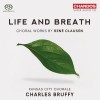| Country: | United States Of America |
| Period: | Contemporary classical music |
Biography
René Clausen (born 1953) is an American composer, conductor of The Concordia Choir, and professor of music at Concordia College in Moorhead, Minnesota. His works are widely performed by high school and church choirs while his more technically demanding pieces have been performed and recorded by college and professional choirs. Among his many accolades, his recent recording, "Life & Breath: Choral Works by René Clausen," received three grammy awards at the 55th Grammy Awards in 2013.[1][2]
Clausen is a frequent guest conductor, guest composer and lecturer, both nationally and internationally. He has conducted All-State choirs in more than 15 states. Prior to his appointment as conductor of The Concordia Choir, Clausen was director of choral activities at West Texas State University, Canyon, Texas, and assistant professor of choral music at Wichita State University. He also served as senior editor of Mark Foster Music Company and as interim conductor of the National Lutheran Choir of Minneapolis.
Raised in California, Clausen graduated from Wilton Senior High School in Wilton, Iowa, holds an undergraduate degree from St. Olaf College, Northfield, Minnesota, and received the Master of Music and Doctor of Musical Arts degrees in choral conducting from the University of Illinois at Urbana-Champaign.
Clausen's compositional style is varied and eclectic, and put to sacred as well as secular texts. He has created compositions and arrangements that range over many artistic media including choral, orchestral, wind ensemble, film, video, and solo voice. Clausen's most popular harmonies are mostly based on close dissonances such as the major and minor second. These chords based on dissonance are also called "tone clusters". His style is sometimes classified as Neo-Romantic but this term can mean many things. All of his works are unmistakably tonal yet they push the boundaries of chordal language. The traditional functions of choral progression are blurred by his use of tone clusters. These ideas are mostly exhibited in pieces such as "Tonight, Eternity Alone", "Magnificat", and "I Thank You God". Less difficult pieces exhibit the same structure as any Classical or Baroque choral piece with a hint of Romantic rubato and expression but largely, very traditional chord progressions.







